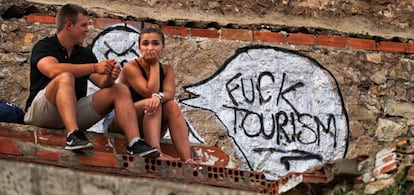Senseless tourism bashing
If attacks against the sector are not stopped, they risk destroying a vital economic motor

The mindless acts of vandalism, some of them very serious, against tourists in Catalonia, Valencia and the Balearics require a forceful response from political parties and public officials. The intimidation of tourists in Barcelona and the attacks against seven hotels in the Catalan capital are unacceptable; the foremost obligation of local governments involved in this campaign of violence against the alleged excesses of tourist inflows is to nip the trend in the bud; to act firmly through administrative and security measures; and of course to actively take part in any complaints filed by affected companies.
It is no coincidence that tourist bullying is emerging just as Catalan institutions closest to separatism are displaying a growing disregard for the law
It is no coincidence that tourist bullying is emerging just as Catalan institutions closest to separatism are displaying a growing disregard for the law, encouraging confrontation, and expressing their determination that they will attain their political goals – in this case, independence – “at any price.” Contempt for the law is the first step in condoning coercion and violence. The next step after that is the rupture of the social fabric. The groups behind this campaign of violence, who call themselves Arran Països Catalans, together with other small groups that embrace left-wing anti-capitalism, have focused on protests against tourism, probably encouraged by a political climate where an “anything-goes” attitude prevails.
Tourism is a decisive industry for the Spanish economy (and even more so for Catalonia’s). It represents over 11% of GDP and sustains growth (above 3% annually) through a steady increase in visitor numbers and per capita spending (nearly €38 billion during the first half of the year).
The success of a country’s tourism industry depends on its geography, culture, and on the trust it inspires in potential travelers. For decades, millions of British, German and French tourists have shown their trust in the political and social stability of Spain, and in the quality of its leisure facilities. But this credibility could be quickly undermined if the idea spreads that tourists are being threatened, intimidated and even subject to physical violence. The tourism industries of several countries have already disappeared as the result of instability and street disorders within their borders. That is why tourism industry leaders’ alarm is amply justified, not just because of the proliferation of these acts of vandalism, but because of the indifference shown by regional public officials.
The success of a country’s tourism industry depends on its natural conditions and on the trust it inspires in potential travelers
Harassment and violence must be rejected on principle. They simply evidence an inner state of rage, confusion and incompetence. The way to reorganize the tourism market is already well known. It includes a rational regulation of tourism services, the introduction of selective, moderate taxes to help improve public infrastructure, campaigns to diversify the business (something more than sun and sand), and specific actions against the undesired effect on some sectors, such as the real estate market.
Nothing can justify these growing acts of tourist-bashing. We need to stop this vandalism from spreading and spawning aberrant politics. Local and regional governments must come together to eliminate this trend, regardless of their political sympathies or strategic affinities with the perpetrators. Allowing the use of violence can ruin an industry that is decisive to the economy; and besides that, it undermines trust in the law as a principle of prosperity.
English version by Susana Urra.
Tu suscripción se está usando en otro dispositivo
¿Quieres añadir otro usuario a tu suscripción?
Si continúas leyendo en este dispositivo, no se podrá leer en el otro.
FlechaTu suscripción se está usando en otro dispositivo y solo puedes acceder a EL PAÍS desde un dispositivo a la vez.
Si quieres compartir tu cuenta, cambia tu suscripción a la modalidad Premium, así podrás añadir otro usuario. Cada uno accederá con su propia cuenta de email, lo que os permitirá personalizar vuestra experiencia en EL PAÍS.
¿Tienes una suscripción de empresa? Accede aquí para contratar más cuentas.
En el caso de no saber quién está usando tu cuenta, te recomendamos cambiar tu contraseña aquí.
Si decides continuar compartiendo tu cuenta, este mensaje se mostrará en tu dispositivo y en el de la otra persona que está usando tu cuenta de forma indefinida, afectando a tu experiencia de lectura. Puedes consultar aquí los términos y condiciones de la suscripción digital.








































